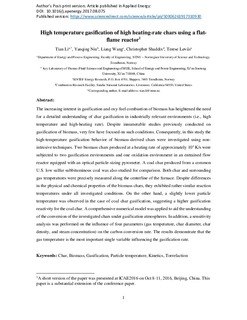High temperature gasification of high heating-rate chars using a flat-flame reactor
Journal article, Peer reviewed
Accepted version
Permanent lenke
http://hdl.handle.net/11250/2586632Utgivelsesdato
2018Metadata
Vis full innførselSamlinger
Sammendrag
The increasing interest in gasification and oxy-fuel combustion of biomass has heightened the need for a detailed understanding of char gasification in industrially relevant environments (i.e., high temperature and high-heating rate). Despite innumerable studies previously conducted on gasification of biomass, very few have focused on such conditions. Consequently, in this study the high-temperature gasification behaviors of biomass-derived chars were investigated using non-intrusive techniques. Two biomass chars produced at a heating rate of approximately 104 K/s were subjected to two gasification environments and one oxidation environment in an entrained flow reactor equipped with an optical particle-sizing pyrometer. A coal char produced from a common U.S. low sulfur subbituminous coal was also studied for comparison. Both char and surrounding gas temperatures were precisely measured along the centerline of the furnace. Despite differences in the physical and chemical properties of the biomass chars, they exhibited rather similar reaction temperatures under all investigated conditions. On the other hand, a slightly lower particle temperature was observed in the case of coal char gasification, suggesting a higher gasification reactivity for the coal char. A comprehensive numerical model was applied to aid the understanding of the conversion of the investigated chars under gasification atmospheres. In addition, a sensitivity analysis was performed on the influence of four parameters (gas temperature, char diameter, char density, and steam concentration) on the carbon conversion rate. The results demonstrate that the gas temperature is the most important single variable influencing the gasification rate.
